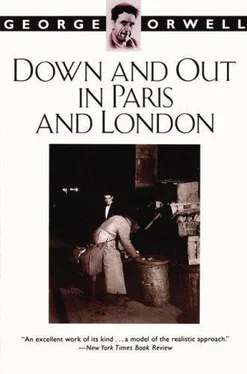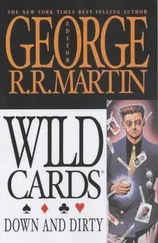George Orwell - Down and Out in Paris and London
Здесь есть возможность читать онлайн «George Orwell - Down and Out in Paris and London» весь текст электронной книги совершенно бесплатно (целиком полную версию без сокращений). В некоторых случаях можно слушать аудио, скачать через торрент в формате fb2 и присутствует краткое содержание. Жанр: Старинная литература, на русском языке. Описание произведения, (предисловие) а так же отзывы посетителей доступны на портале библиотеки ЛибКат.
- Название:Down and Out in Paris and London
- Автор:
- Жанр:
- Год:неизвестен
- ISBN:нет данных
- Рейтинг книги:5 / 5. Голосов: 1
-
Избранное:Добавить в избранное
- Отзывы:
-
Ваша оценка:
- 100
- 1
- 2
- 3
- 4
- 5
Down and Out in Paris and London: краткое содержание, описание и аннотация
Предлагаем к чтению аннотацию, описание, краткое содержание или предисловие (зависит от того, что написал сам автор книги «Down and Out in Paris and London»). Если вы не нашли необходимую информацию о книге — напишите в комментариях, мы постараемся отыскать её.
Down and Out in Paris and London — читать онлайн бесплатно полную книгу (весь текст) целиком
Ниже представлен текст книги, разбитый по страницам. Система сохранения места последней прочитанной страницы, позволяет с удобством читать онлайн бесплатно книгу «Down and Out in Paris and London», без необходимости каждый раз заново искать на чём Вы остановились. Поставьте закладку, и сможете в любой момент перейти на страницу, на которой закончили чтение.
Интервал:
Закладка:
sort of place for you and me, eh? Do you know what my
friends say to me? They say, 'M-, you are past
redemption.' Quite true, I am past redemption.
I've come down in the world; not like these-----
s here,
who couldn't come down if they tried. We chaps who
have come down ought to hang together a bit. Youth will
be still in our faces-you know. May I offer you a drink?"
He produced a bottle of cherry brandy, and at the same
moment lost his balance and fell heavily across my legs.
Paddy, who was undressing, pulled him upright.
"Get back to yer bed, you silly ole-----
!"
The old Etonian walked unsteadily to his bed and
crawled under the sheets with all his clothes on, even his
boots. Several times in the night I heard him murmuring,
"M-, you are past redemption," as though the phrase
appealed to him. In the morning he was
lying asleep fully dressed, with the bottle clasped in his
arms. He was a man of about fifty, with a refined, worn
face, and, curiously enough, quite fashionably dressed. It
was queer to see his good patent-leather shoes sticking out
of that filthy bed. It occurred to me, too, that the cherry
brandy must have cost the equivalent of a fortnight's
lodging, so he could not have been seriously hard up.
Perhaps he frequented common lodginghouses in search of
the "nancy boys."
The beds were not more than two feet apart. About
midnight I woke up to find that the man next to me was
trying to steal the money from beneath my pillow. He was
pretending to be asleep while he did it, sliding his hand
under the pillow as gently as a rat. In the morning I saw
that he was a hunchback, with long, apelike arms. I told
Paddy about the attempted theft. He laughed and said:
"Christ! You got to get used to dat. Dese lodgin'
houses is full o' thieves. In some houses dere's notlain'
safe but to sleep wid all yer clo'es on. I seen 'em steal a
wooden leg off a cripple before now. Once I see a man-
fourteen stone man he was-come into a lodgin'-house wid
four pound ten. He puts it under his mattress. 'Now,' he
says, 'any dat touches dat money does it over my body,'
he says. But dey done him all de same. In de mornin' he
woke up on de floor. Four fellers had took his mattress by
de corners an' lifted him off as light as a feather. He never
saw his four pound ten again."
XXX
THE next morning we began looking once more for
Paddy's friend, who was called Bozo, and was a screever-
that is, a pavement artist. Addresses did
not exist in Paddy's world, but he had a vague idea that
Bozo might be found in Lambeth, and in the end we ran
across him on the Embankment, where he had established
himself not far from Waterloo Bridge. He was kneeling on
the pavement with a box of chalks, copying a sketch of
Winston Churchill from a penny note-book. The likeness
was not at all bad. Bozo was a small, dark, hook-nosed
man, with curly hair growing low on his head. His right
leg was dreadfully deformed, the foot being twisted heel
forward in a way horrible to see. From his appearance one
could have taken him for a Jew, but he used to deny this
vigorously. He spoke of his hook-nose as "Roman," and
was proud of his resemblance to some Roman Emperor-it
was Vespasian, I think.
Bozo had a strange way of talking, Cockneyfied and
yet very lucid and expressive. It was as though he had
read good books but had never troubled to correct his
grammar. For a while Paddy and I stayed on the
Embankment, talking, and Bozo gave us an account of the
screeving trade. I repeat what he said more or less in his
own words.
"I'm what they call a serious screever. I don't draw in
blackboard chalks like these others, I use proper colours
the same as what painters use; bloody expensive they are,
especially the reds. I use five bobs' worth of colours in a
long day, and never less than two bobs' worth.' Cartoons
is my line-you know, politics and cricket and that. Look
here"-he showed me his notebook-"here's likenesses of all
the political blokes, what I've copied from the papers. I
have a different cartoon every day. For instance, when the
Budget was on I had one of Winston trying to push an
elephant
1
Pavement artists buy their colours in the form of powder,
and work them into cakes with condensed milk
.
marked 'Debt,' and underneath I wrote, 'Will he budge
it?' See? You can have cartoons about any of the parties,
but you mustn't put anything in favour of Socialism,
because the police won't stand it. Once I did a cartoon of
a boa constrictor marked Capital swallowing a rabbit
marked Labour. The copper came along and saw it, and
he says, 'You rub that out, and look sharp about it,' he
says. I had to rub it out. The copper's got the right to
move you on for loitering, and it's no good giving them a
back answer."
I asked Bozo what one could earn at screeving. He
said:
"This time of year, when it don't rain, I take about three
quid between Friday and Sunday-people get their wages
Fridays, you see. I can't work when it rains; the colours
get washed off straight away. Take the year round, I make
about a pound a week, because you can't do much in the
winter. Boat Race day, and Cup Final day, I've took as
much as four pounds. But you have to cut it out of them,
you know; you don't take a bob if you just sit and look at
them. A halfpenny's the usual drop [gift], and you don't
get even that unless you give them a bit of backchat.
Once they've answered you they feel ashamed not to give
you a drop. The best thing's to keep changing your
picture, because when they see you drawing they'll stop
and watch you. The trouble is, the beggars scatter as soon
as you turn round with the hat. You really want a nobber
[assistant] at this game. You keep at work and get a crowd
watching you, and the nobber comes casual-like round the
back of them. They don't know he's the nobber. Then
suddenly he pulls his cap off, and you got them between
two fires like. You'll never get a drop off real toffs. It's
shabby sort of blokes you get most off, and foreigners.
I've had even sixpences off Japs, and blackies, and that.
They're not so bloody mean as what an Englishman is.
Another thing to remember is to keep your money
covered up, except perhaps a penny in the hat. People
won't give you anything if they see you got a bob or two
already."
Bozo had the deepest contempt for the other screevves
on the Embankment. He called them "the salmon
platers." At that time there was a screever almost every
twenty-five yards along the Embankmenttwenty-five
yards being the recognised minimum between pitches.
Bozo contemptuously pointed out an old white-bearded
screever fifty yards away.
"You see that silly old fool? He's bin doing the same
picture every day for ten years. 'A faithful friend' he calls
it. It's of a dog pulling a child out of the water. The silly
old bastard can't draw any better than a child of ten. He's
learned just that one picture by rule of thumb, like you
learn to put a puzzle together. There's a lot of that sort
about here. They come pinching my ideas sometimes; but
I don't care; the silly s can't think of anything for
themselves, so I'm always ahead of them. The whole
thing with cartoons is being up to date. Once a child got
Читать дальшеИнтервал:
Закладка:
Похожие книги на «Down and Out in Paris and London»
Представляем Вашему вниманию похожие книги на «Down and Out in Paris and London» списком для выбора. Мы отобрали схожую по названию и смыслу литературу в надежде предоставить читателям больше вариантов отыскать новые, интересные, ещё непрочитанные произведения.
Обсуждение, отзывы о книге «Down and Out in Paris and London» и просто собственные мнения читателей. Оставьте ваши комментарии, напишите, что Вы думаете о произведении, его смысле или главных героях. Укажите что конкретно понравилось, а что нет, и почему Вы так считаете.












